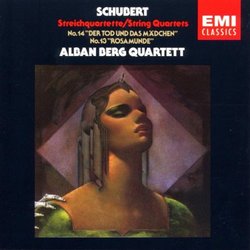| All Artists: Franz Schubert, Alban Berg Quartet Title: Schubert: String Quartets Nos. 13 "Rosamunde" & 14 "Death and the Maiden" Members Wishing: 0 Total Copies: 0 Label: Capitol Release Date: 10/25/1990 Album Type: Original recording reissued Genre: Classical Style: Symphonies Number of Discs: 1 SwapaCD Credits: 1 UPC: 077774733328 |
Search - Franz Schubert, Alban Berg Quartet :: Schubert: String Quartets Nos. 13 "Rosamunde" & 14 "Death and the Maiden"
 | Franz Schubert, Alban Berg Quartet Schubert: String Quartets Nos. 13 "Rosamunde" & 14 "Death and the Maiden" Genre: Classical |
Larger Image |
CD Details |
CD ReviewsPowerful and dramatic - one of the best "Death & the Maiden" Discophage | France | 10/02/2006 (5 out of 5 stars) "These are studio recordings, dating from 1985 and completing a series begun in the late 70s with the C-major quintet and pursued in the early 80s with the 15th quartet and the "Trout" quintet. The "Death and the Maiden" here is not to be confused with the later, live recording made by the ABQ and released in 1998 - which I haven't heard, but which received warm reviews. The Alban Berg Quartet of course needs no advocacy. They have secured a firm position at the very top of the list of major string quartets in activity today, and this particular CD was greeted with many positive reviews. Yet, as I oftentimes find myself to be not in agreement with the critics' approval (or disapproval), I am happy to report that, of the more than twenty different versions that I have heard of Schubert's "Death and the Maiden" (from the Capet Quartet's 1928 recording to the present - and see my other comments for reviews of some of those), this goes right at the top of the pile. The formidable tension the ABQ elicits in the opening Allegro derives not from the adoption of frenzied speeds as did the Capet Quartet in 1928 or the Emerson and Petersen Quartets (DG and Capriccio) recently but rather, helped by close recording and spacious acoustics, from tremendous vigor of bow attack on the strings - but never at the expense of tonal beauty - and crescendos of symphonic scope, lending the movement's dramatic moments an almost desperate power. Their rather spacious tempo also allows them to express the lyrical charm of the 2nd theme with no slowdown, and throughout the movement's alternation of drama and charm they maintain a commendable unity of tempo, displaying a fine concern for the music's structural coherence - the opposite of what the Juilliard Quartet does in both its recordings from 1959 (RCA now on Testament) and 1982 (Sony) with its constant accordion-like tempo shifting. The same coherence of tempo relationships is again a remarkable feature of their 2nd movement, the "Death and the Maiden" theme and variations. While they don't conjure the same other-wordly sonorities as did the Juilliard Quartet in 1959, their utterance of the theme is rather on the fast side and true to Schubert's "Andante con moto", and in the ensuing variations, unlike many, they don't sacrifice unity of tempo to dramatic effect. Günter Pichler's violin in the 1st and 4th variations and Valentin Erben's cello in the third deliver a deeply-moving chant, variation 3 is not rushed but massive and hefty. More questionable though is the crescendo they apply on both utterances of the 5th variation's first part, where Schubert prescribes it only in the repeat. The same raging vigor of accents is at play in the Scherzo, taken at a relatively brisk tempo (but not as precipitately as the Petersen Quartet) and while the Alban Bergs apply a slowdown of tempo in the middle trio (Schubert wrote no tempo change here), unlike many who do they manage to lend it charm without mawkishness. Again the brisk Finale has vigor and power as well as strongly marked dynamic contrasts. It sounds like an implacable and desperate race to the abyss. There are other legitimate approaches and there has been a number of recordings worthy of note (the one by the Emerson Quartet on DG is another favourite, as well as a hard-to-find one by the Fine Arts Quartet on the defunct Swiss label Lodia), but I tend to find most of them flawed in one respect (or movement) or the other. Not so with the Alban Berg Quartet, which I find convincing and gripping throughout. The same interpretive options are at play in the "Rosamunde" (13th) Quartet. Those who expect charm and easy-going amiability, stay aloof. The Alban Bergs seize every opportunity to heighten the piece's drama, with powerful and strongly-marked accents. Yet their choices of tempo seem always well-judged, with an easy-going and amiable "allegro moderato" finale. " Very edgy and intense -- I prefer the live remakes Santa Fe Listener | Santa Fe, NM USA | 09/23/2008 (4 out of 5 stars) "The ABQ slashes at the opening bars of the 'Death and the Maiden" Quartet to a nerve-racking degree, and they keep up the razor's-edge intensity throughout, with respites only in the slow movment. The "Rosamunde' reading is less foerocious, but EMI has remakes of both quartets in live concerts from the 90's that are mellower without losing intensity. This follows the same pattern as with the ABQ's two Beethoven cycles, where the live remakes are better all around.
I should also point out that EMI's glassy, early digital sound doesn't help. It's ear-piercing at loud volume. And although the other reviewer here describes the miking as close-up, actually it's not. We get quite a bit of ambient acoustic, which magnifies the size of the group, in case that appeals to you. I don't need to hear a string quartet sound bigger than all outdoors. In any case, I adore the later live recordings and wanted to offer the choice to prospective buyers." |
